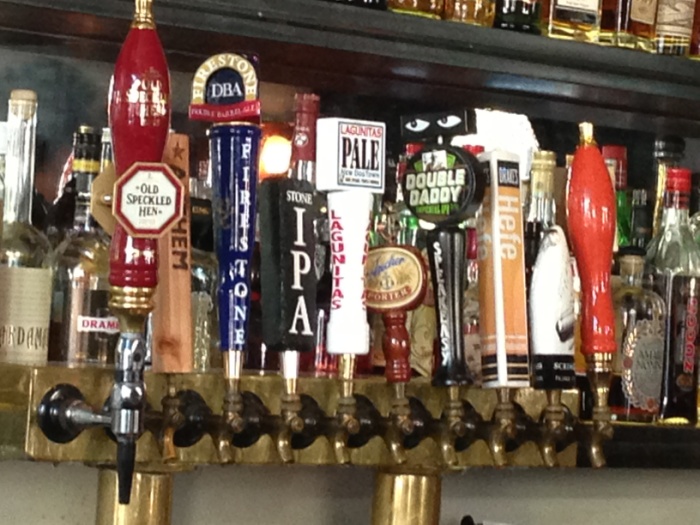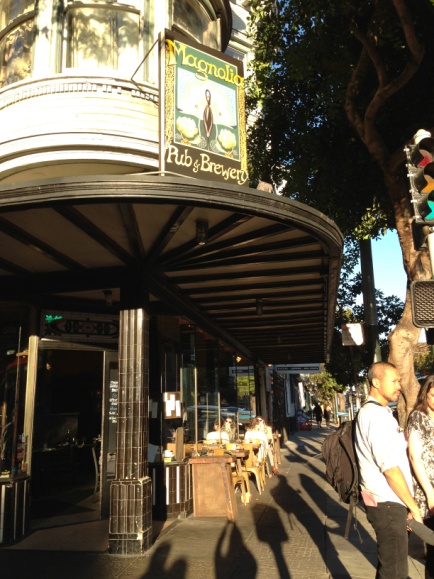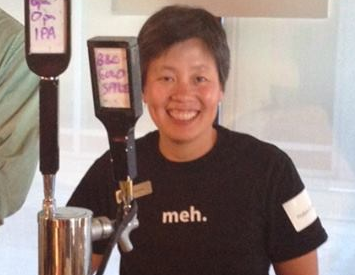By Amy Tindell
I recently spent 12 (long) hours on a plane to enjoy 48 (spectacular) hours in San Francisco. My previous visit in 2012 provided a thorough education in Napa wine and food, but this year, my friends made it their mission to indulge one of my favorite hobbies: beer tourism. Anchor Brewing Company, approximately 5 blocks from their house in Potrero, is closed on weekends, so I had to satisfy myself with a pilgrimage to gaze upon the building without the privilege of tasting on the premises.

I consoled myself with the thought that my efforts were better-focused on tastes I couldn’t find on the East Coast anyway. Accordingly, our first destination was Bar Bocce in Sausalito. While not a “beer bar,” it features several local beers, cocktails designed for a life of leisure, and a food menu offering pizzas and seaside snacks, packed with trendy ingredients like kale and bacon. The bar’s beacon is its patio, situated on the water, complete with a firepit and sand bocce court. The patio’s ambience is topped off by tables of Sausalito girls sporting puffy jackets and scarves who refuse to allow the waiters to turn off the overhead heaters in the 68 degree weather.

Undeterred by the 68 degree chill, we tasted two local beers along with our kale and bacon. The first was Hangar 24 Orange Wheat. Hangar 24 Craft Brewery, located in Redlands, CA, was founded on a shared love for beer and aviation. Its Orange Wheat brew is crisp and light, but not very wheat-y or cirtrus-y, with muted flavors. While I prefer less subdued flavor, it would be an appropriate complement to a hot summer day, and drinking it has the added benefit of supporting local agriculture: the brewery adds local oranges purchased from an orange conservancy throughout the brewing process.

Headlands Brewing Company, situated nearby in Marin, provided our next beer in the form of a Pt. Bonita Rustic Lager. Headlands takes what some craft beer snobs think when they hear “lager” and adds a lot of flavor, in the form of hop spiciness (Liberty, Saaz and Crystal), a solid 4-malt backbone (2-Row, Pilsner, Munich, and Rye), and a healthy 6.2% ABV. The result is something between a Pilsner and a pale lager, boosted further by a surprising yet pleasing alcohol finish. This lager is named for the Point Bonita Lighthouse in the Marin Headlands, a “guiding light for ships full of prospectors, immigrants, pirates, sailors and cargo for over 150 years,” and reflects the Brewery’s focus on entrepreneurism, responsible business practices, and community spirit. (Reflecting my own community spirit, I take my hat off to Patrick Horn, CEO of Headlands Brewing Company, and fellow graduate of WPHS in Virginia.)
Next, I walked in to the DogPatch Saloon, sidled up to the bar, and asked the bartender for whatever I couldn’t get in Boston. His response involved a delicious concoction based on Bender’s Rye Whiskey, crafted in San Francisco and aged seven years. Moving on to the taps, the bartender recommended Speakeasy Double Daddy. Speakeasy, another brewery after my own heart, “harbors a love for the sinister and the underground,” and true to its roots, the Butchertown tasting room is “designed as a wood-paneled basement hideaway.” Its Double Daddy, an imperial IPA, pours a light golden color with amber hues, and smells of caramel malts and citrus hops. The taste follows with similarly balanced flavors, and with very little of the sweetness that imperial IPAs often offer. The lack of alcohol sweetness made the finish of Double Daddy bitter for my taste, but I reminded myself that hop dominance is all part of the West Coast experience.

When two dogs entered the saloon with their owners and settled around a nearby table, the bartender explained to me that many local establishments welcome canine companions, in homage to the neighborhood’s historical reputation as a gritty, industrial area with roaming packs of dogs. Currently, the neighborhood maintains some of that industrial grit, but has developed a reputation for inspiring entrepreneurship and innovative ideas. I decided to finish off my beer with my new friends.

As with many San Francisco adventures, our last stop was in Haight. The Magnolia Gastropub and Brewery charms the corner of Haight and Masonic, offering a full menu that would intrigue any self-respecting foodie, in addition to a diverse selection of draught and cask beers. The menus themselves delightfully portray brewing specifications for historical beers.


I ordered Sara’s Ruby Mild, winner of a gold medal at the 2009 Great American Beer Fest. An English Dark Mild Ale, the beer indeed pours deep ruby in color, with little foam. Sara’s smells and tastes principally of raisin and other dried fruit, with a bready, caramel malt sweetness, giving the beer a toasty, biscuit flavor. The brew features a hint of bitterness, but overall it is light, smooth, and very drinkable.


Our waiter confirmed the rumor that Magnolia is planning a new location in the DogPatch, approximately 3 blocks from my friends’ house. I’ve made it my goal to return when it opens… After all, I left my heart – at least the part of it that yearns to see dogs in bars, beer brewing daily, and new cheese shops popping up behind formerly barred windows – in San Francisco.

